West ‘spares no effort’ to undermine Moscow’s dialogue with New Delhi – Russian envoy
In an exclusive, Ambassador Denis Alipov speaks to RT on India’s role in the emerging world order and Moscow’s outlook on bilateral ties
India and Russia have maintained a robust strategic partnership, rooted in historical ties and shared interests, over decades. Central to this relationship is extensive defense cooperation, with Russia serving as a major supplier of military equipment to India and both nations engaging in joint military exercises, co-development of advanced military platforms, and technology transfers.
More recently, energy collaboration has become another strong pillar of bilateral ties: the Kudankulam nuclear power plant (KNPP), India’s largest, is being built in Tamil Nadu with technical assistance provided by Moscow. Russia’s expertise in nuclear technology has been instrumental in advancing India’s capabilities, fostering a mutually beneficial partnership. The two countries have pledged to deepen their nuclear cooperation, recognizing its strategic importance for energy security and technological advancement.
Over the past 18 months, India has emerged as one of the largest importers of Russian oil – a stand New Delhi has had to defend on many occasions from accusations by Western media, and even some political leaders, of funding “Russia’s war” with Ukraine.
RT sat down with Denis Alipov, Russian Ambassador to India, to discuss where the relationship between the two “strategic privileged partners” stands today, and what is the way forward.
Your diplomatic career has been intertwined with India. Please compare the India you first knew, and the India you work in now, how has the country evolved since your first posting?
My diplomatic service here started back in the 1990s, which for India, like many other countries, was a period of adaptation to a post-bipolar world and the beginning of an era of economic liberalization and diversified foreign policy. Over the past few decades, the country managed to focus on opportunities provided by bilateral relations with all leading states to support its own development. India in turn brought to those relationships its colossal human and innovative potential.
India has achieved impressive results. 10 years ago it became the 10th largest economy in the world, and according to current estimates its GDP could reach $5 trillion in the next three years, which would place it in the top three. Today the country is fourth in terms of gold and foreign exchange reserves ($586 billion). At the same time, India is not going to stop here, while it continues qualitative transformation in many areas. It is one of the most dynamically developing poles in the world and a priority trade and investment partner for Russia and many other countries.
All this, coupled with noticeably intensified foreign policy, puts India in a leading position on the global stage, inter alia as an influential voice of the Global South, which seeks to increasingly participate in shaping the global agenda. So, now we are dealing with a mighty world power that knows its own worth.
In one word – how would you describe 2023 for Russia-India ties? And one word for your expectations in 2024?
The past year was quite successful for our bilateral ties, which transformed qualitatively. We therefore expect 2024 to bring further positive developments.
There’s a perception of Russia among some in India’s business community of it being a country broken by conflict and sanctions, rather than a country worthy of their investment. Are they correct in thinking this way?
In India, Russia enjoys a solid reputation as a reliable, sincere, well-intentioned, time-tested friend. Such an image was initially shaped due to the major contribution of the USSR to Indian socio-economic development, and it largely persists to this day.
Our ties continue to steadily expand in a wide range of areas according to our converging national interests. But unlike our Western partners, we have never conditioned cooperation on politics, have not interfered in domestic affairs, and have always maintained mutually respectful and trusted relationships. Therefore, even now we mainly see a growing desire to keep working together and finding ways to overcome well-known impediments caused by destructive unilateral approaches.
This probably haunts the West that spares no effort to undermine our dialogue. The Western media widely represented in India launched a targeted campaign to discredit Russia.
US officials who come here do not hesitate to directly state that they are pursuing the goal of tearing New Delhi away from Moscow. They are even making threats with secondary sanctions. Some Indian partners are forced to exercise caution, sometimes – frankly speaking – excessively, but there are also a significant number of those for whom such an approach is unacceptable. How else can we explain the growing dynamics of our interaction and contacts at almost all levels, including the highest one?
One of the problems is that businesses in both countries are still not sufficiently aware of each other’s capabilities. We are working on it. We encourage the expansion of dialogue between the media, support business missions and forums as well as exchanges between regions.
It should be noted that over the recent years the number of such contacts has increased manifold, and they are becoming more and more meaningful, including distributing information detailing the economic and investment potential and promising areas for interaction. It is indicative that the current bilateral trade turnover, which at the end of 2023 may exceed $60 billion, is several times higher than “pre-sanctions” figures.
Visionary entrepreneurs are well aware that, following the politically motivated withdrawal of Western companies, now is a proper time to enter the capacious Russian market. For our part, we provide Indian businessmen with all assistance. Their example and experience will debunk the myths.
In the past year, the imbalance of growing bilateral trade has become the central theme in building sustainable economic relations between Russia and India. What is the plan of the two countries for addressing this?
Our trade and economic cooperation has reached an unprecedented level. Russia is one of India’s four main trading partners. We maintain a leading position in the supply of hydrocarbons providing more than a third of Indian imports. Supplies of mineral fertilizers and products of the agricultural and diamond sectors are growing. All this creates a favorable atmosphere for our mutually beneficial cooperation to achieve new heights and strengthens the feeling of mutual trust in the business environment.
That is correct – the reverse side of such a dynamic is the growing trade imbalance, which now amounts to about $56 billion in favor of Russia. This problem is recognized by both aides. We are dedicated to consistently resolve it by diversifying our trade and economic partnership. We’ve already seen tangible results – supply of Indian goods to Russia is steadily growing. In January-November of the last year, Indian export to Russia increased by 42% to $3.7 billion, mainly due to a considerable hike in shipments of machinery and equipment, electronics, chemicals and pharmaceuticals, iron and steel, agricultural products.
We focus on unleashing the potential of joint projects. We are developing cooperation in the railway sector, energy, chemical production, heavy engineering, and the mining industry. There are successful engagements in the areas of ICT, as well as in very promising “smart city” initiatives – Moscow, in particular, has become an inspiration in this regard.
Among the priority topics are alternative logistics routes. We have noticeably intensified work on the International North – South Transport Corridor and the Vladivostok – Chennai Eastern Sea Route, with due attention to modernizing port infrastructure and harmonizing customs procedures.
We are making focused efforts to find new ways of banking and insurance coverage, with an emphasis on connecting national payment systems as well as the use of national currencies in mutual settlements – for that, solving the problem of trade imbalances is crucially important. We involve Indian industry associations to expand the supply of popular engineering products, electronics, auto components, medicines and pharmaceutical substances to the Russian market.
We look forward to the prospect of an early conclusion of an FTA between the Eurasian Economic Union and India, which will eliminate a number of barriers and expand mutual access to markets.
In recent years, New Delhi has actively diversified its military equipment supply channels, with the share of several Western countries increasing. Given Russia’s own requirements for weapons, how successful is Russia in competing in this market? Can we expect greater Russian involvement in ‘Make in India’ for defense and other areas? What are the prospects of joint military equipment production?
Our defence cooperation remains not only successful, but also unmatched according to a number of indicators. Indeed, India is diversifying its purchases, and the share of other foreign partners in the Indian market is steadily increasing. However, the Russian segment remains dominant, at least at 50%.
Moreover, we have long adopted technology transfers and the practice of creating joint ventures, which applies, in particular, to Su-30MKI fighters, T-90 tanks, and AK-203 assault rifles. The BrahMos supersonic cruise missile is a matter of pride, whose characteristics are constantly improved.
We are also considering joint expansion into third countries, including taking into account the capabilities of the private sector. The work is on in the innovative field. Most importantly, our collaboration is highly aligned with New Delhi’s Make in India and Atmanirbhar Bharat localization initiatives.
The essential point is that our cooperation is long-term, based on trust and strong mutual interests. Russian weapons often surpass many foreign analogues in their parameters and are constantly in high demand.
India landed on Moon last year. Its next ambitious mission is a human spaceflight. How is Russia participating in this and/or other projects with the ISRO, given the history of cooperation in this field?
Successful cooperation in the space sector is one of the pillars of the Russian-Indian strategic partnership. At various stages there have been significant milestones; one of which was the space flight of the first Indian cosmonaut, Rakesh Sharma, as part of the Soviet crew in 1984. This year we celebrate the 40th anniversary of that event.
We have built a solid experienced partnership, now conducted in three main areas – manned space programs, cryogenic engines and satellite navigation based on combining the capabilities of the Russian GLONASS and the Indian NavIC systems.
I would like to especially highlight Russia’s role in the Indian manned space program – Gaganyaan, which includes training of astronauts, work on life support and thermal systems for spacecraft, testing their models and emergency rescue systems, supplying windows, spacesuits and crew seats.
We also pay great attention to space medicine issues. We are significantly expanding our coordination on the relevant multilateral tracks. In particular, within BRICS the Outer Space Remote Satellite Constellation agreement is being implemented.
India’s G20 leadership has been widely praised for giving voice to the Global South, will it have a far-reaching effect on how global challenges are approached – and how you work as a diplomat – going forward?
Russia highly appreciates the outcomes of India’s G20 presidency in 2023, which succeeded in reaffirming the group’s mandate as the leading forum for resolving global economic and financial problems and placing the interests and needs of the Gobal South at its forefront.
The decision on the African Union’s accession to the G20 was a historic step, strengthening the voice of developing countries in favor of democratizing global governance. At the same time, Indian partners managed to prevent attempts to hijack the dialogue over the Ukraine conflict, which ultimately made it possible to reach consensus and focus multilateral efforts on sustainable development issues.
We note with satisfaction that the current Brazilian presidency of the Group has confirmed its readiness to ensure continuity of the forum’s agenda. This is based on the groundwork laid by India to further promote balanced and inclusive cooperation in such areas as digitalization, energy transition, regulation of cryptocurrencies, financial and debt sustainability, reform of multilateral development banks, etc.
Our close coordination on G20 issues with New Delhi and other partners, in particular, within the expanded BRICS – this year under Russia’s chairmanship – is helping to shape a more just and equal multipolar system and enhance the global role of new emerging centers of power. In this regard, my primary tasks include supporting this irreversible trend in the context of expanding a comprehensive Russian-Indian dialogue.
What changes could we see for India, and the Global South, if Delhi is given a permanent seat at the UNSC? How would that impact the UN in your opinion given the recent criticism of the organisation?
Polarization at the UN significantly complicates dialogue on expanding the Security Council, in which the West is already disproportionately “overrepresented”. Against this background, we are doubtful of the vigorously promoted applications of new Western candidates.
At the same time, it is widely recognized that bringing the composition of the UN Security Council in to line with modern realities, bearing in mind the well-founded aspirations of India and other reputable contenders from Asia, Africa and Latin America for permanent membership, is long overdue. In this respect we value the broadest possible consensus.
We have repeatedly indicated our support for New Delhi’s candidacy. Our Indian partners have proven themselves worthy during their non-permanent membership in the UNSC in 2021-2022 and have successfully led the Council twice. Their G20 presidency was also a clear confirmation of their high professionalism in multilateral diplomacy and the ability to find consensus amid growing geopolitical tensions.
Therefore, we are of the view that India as a permanent member of the Security Council could make a significant contribution to promoting balance as well as an agenda focused on the interests of the world majority, primarily the countries of the Global South.
On a lighter note – a quick-fire round:
– Moscow or Delhi traffic? – I’m comfortable with both.
– Favourite curry? – I’m fond of Mughlai cuisine.
– Do you play cricket? – Not anymore. I used to as a child, though.
– Goa or Manali? – India is incredible all over as is Russia.
– Favourite Bollywood movie? – I don’t go to the movies much, can’t remember the last time I did. However, I recently watched “The Challenge” a Russian feature shot in space at the ISS with professional actor Julia Peresild having undertaken a space travel for that purpose. Superb! I hope to promote its broader release in India. It’s very inspirational and life-affirming.
Where India Meets Russia – We are now on WhatsApp! Follow and share RT India in English and in Hindi



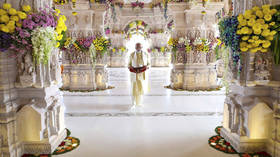
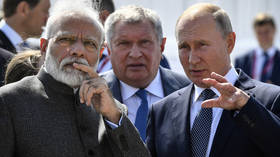
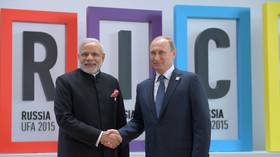
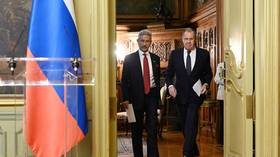
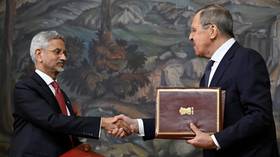


Comments are closed.